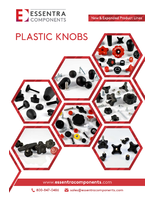Pressure Sensors / Detectors / Transducers
Piezoelectric Pressure Sensors aid composite component manufacturing.
Press Release Summary:
Type 6162A sensors offer sensitivity of 16.9 pC/bar and measuring range of 0-200 bar, while Type 6163A units have sensitivity of 4 pC/bar with range of 0-1,000 bar. Both piezoelectric sensors are suited for measurement of cavity pressure during injection molding and pressing of low-viscosity melts. They detect minute changes in pressure in processing of curable, crosslinking molding compounds. Featuring 6 mm front dia, compact units mount with nut or spacer sleeve.
Original Press Release:
New High-Sensitivity Pressure Sensor, Monitors the Process and Quality in the Manufacturing of Composite Components
Kistler has developed its new Types 6162A... and 6163A... as diaphragm sensors for high-precision measurement of the cavity pressure during injection molding and pressing of low-viscosity melts. They allow quality assurance in the processing of cross-linking molding compounds and in various low-pressure methods, thereby making an important contribution to greater process transparency and reliable part quality. Kistler will launch its new sensors on Stand 10F04 in Hall 10 at K 2010, the world-leading International Trade Fair for Plastics and Rubber to be held from the 27th of October to the 3rd of November, 2010 in Düsseldorf.
The main field of application for the new sensors is the production of fiber-reinforced lightweight plastic structures and composite parts for the automobile and aerospace industries using conventional and high-pressure RTM. These sensors can also be used for injection molding and pressing of temperature-resistant components for domestic appliances and electrical products from thermosetting materials such as BMC and SMC, and from elastomers and liquid silicone resin (LSR).
The new, robust piezoelectric sensors are offered in two versions - with the sensitivity of 16.9 pC/bar and the measuring range of 0 ... 200 bar as Type 6162A... , and the sensitivity of 4 pC/bar with the measuring range of 0 ... 1 000 bar as Type 6163A... . Both versions are available as Types for mold temperatures <200°C or <300°C. All Types of sensors are available with the option of a coated front, as composites and thermosetting materials often contain highly abrasive fillers and reinforcing materials such as carbon or glass fibers.
These compact sensors have a front diameter of 6 mm and are mounted with a nut or spacer sleeve. They detect even minute changes in pressure in the processing of curable, crosslinking molding compounds. The process monitoring system CoMo Injection Type 2869B..., analyzes the curve of the mold cavity pressure. In addition to the stability of the process and the progress of the crosslinking reaction in the mold the CoMo Injection allows the quality of the resultant part to be deduced.
The new high-sensitivity diaphragm sensors Types 6162A.../6163AA... from Kistler measure the cavity pressure during injection molding and pressing of fiber-reinforced lightweight plastic structures from low-viscosity melts, thereby making an important contribution to quality assurance Kistler will present its portfolio of products for plastics processors, moldmakers and manufacturers of plastics machinery on Stand 10F04 in Hall 10 at K 2010 - the International Trade Fair for Plastics and Rubber to be held from the 27th of October to the 3rd of November 2010 in Düsseldorf. On its own stand, Kistler will demonstrate quality assurance of injection molding of a medical part on the basis of mold cavity pressure.
At K 2010 Kistler will also be providing live demonstrations of the capabilities of its sensors and systems on nine separate injection molding machines on stands of partnering companies in Halls 10, 11, 13, 14, 15 and 16. The spectrum of applications range from the development of new methods of processing through optimization of injection molding processes to quality assurance and process control in large-scale production.
Background: Quality Assurance with Mold Cavity Pressure The cavity pressure curve is considered to represent a fingerprint of the injection molding process. It is the most informative characteristic for evaluating the quality of the part.
Deviations from the optimum curve are clear indications of process fluctuations that lead to part defects ranging from incomplete mold filling to flashing or dimensional discrepancies.
As the supplier with the largest and widest range of sensors for all methods of injection molding, simple connection technology and intuitively easy to operate, networkable systems, Kistler is the only manufacturer to offer complete monitoring of injection molding from a single source. Kistler is the world's leading manufacturer of pressure and temperature sensors for use in the plastics processing industry.
Kistler Group
Eulachstrasse 22 Tel. +41 52 224 11 11 ZKB Winterthur BC 732 IBAN: CH67 0070 0113 2003 7462 8 8408 Winterthur Fax +41 52 224 14 14 Swift: ZKBKCHZZ80A VAT: 229 713
Switzerland info@kistler.com Account: 1132-0374.628 ISO 9001 certified www.kistler.com 500-675e-09.10
Kistler Group
Kistler's core competence is the development, production and use of sensors for measuring pressure, force, torque and acceleration. Kistler's know-how and electronic systems can be used to prepare measuring signals for use in analyzing physical processes, controlling and optimizing industrial processes, improving product quality in manufacturing and improving performance in sports and rehabilitation. Kistler offers a comprehensive range of sensors and systems for engine development, automotive engineering, plastics and metal processing, installation technology and biomechanics. A worldwide sales presence in the form of 25 group companies and 30 distributors ensures customer proximity, application support on an individual level and short lead times. With a staff of about 1 000, the Kistler Group is one of the world's leading providers of dynamic measuring instrumentation. The Kistler Group achieved turnover of 166 million Swiss Francs in the 2009 financial year.




